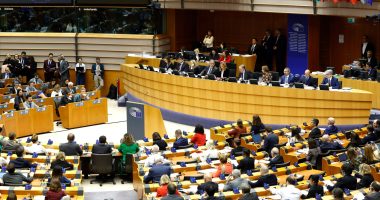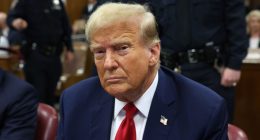Antony Blinken has landed in China amid a worsening rift between the world’s two most powerful countries that threatens to overshadow otherwise improving relations.
The US secretary of state arrives with a warning that the US and its European allies are no longer prepared to tolerate China’s sale of weapon components and dual-use products to Russia, which are helping Vladimir Putin rebuild and modernise his arms factories, enabling him to intensify his onslaught on Ukraine.
Relations between China and the US had been warmer recently, with Beijing significantly less bellicose in its military posturing in the Taiwan strait since the meeting between Xi Jinping and Joe Biden in Woodside, California, in 2023. In the wake of that summit, progress was made on people-to-people ties, more than doubling the number of flights between the two countries, for example.
At Woodside, Xi also agreed to take action to curb the flow of precursors and equipment used in the making of fentanyl in Latin America, which is causing rising deaths among young Americans.
On his three-day visit, Blinken will first stop in Shanghai on his way to Beijing, to speak to students and attend a basketball game, the sort of popular diplomacy that would have been unthinkable a year ago, when bilateral relations were fraught, mostly over Taiwan.
However, when Blinken reaches Beijing for a meeting with his counterpart Wang Yi on Friday, expected to last six hours, and most likely with Xi too, the mood could cool, with discussions about China’s sale of dual-use products to Russia on the agenda.
US sanctions against the Chinese companies involved are also looming over this week’s visit.
“We’re committed to taking the steps necessary to defend our national interests,” a senior administration official said, adding that the planned measures would be aimed at “firms that are taking steps in contravention to our interests and in ways that severely undermine security in both Ukraine and Europe.”
“This will be a key issue of discussion while we’re in Beijing,” the official said. The Wall Street Journal reported that the Biden administration was also considering sanctions against Chinese banks, but US officials say that there are no imminent plans to take such measures.
The US believes its hand is strengthened on this issue having discussed a common position with European allies, who are alarmed by the prospect of a rebuilt, modernised and battle-hardened Russian military in the hands of an increasingly aggressive leader in the Kremlin. The G7 foreign ministers issued a strongly worded statement earlier this week, saying: “China should ensure that this support stops.”
“My expectation is that friends in Europe will have opportunities to express their concerns both in public and private to Chinese officials as well,” the senior administration official said. “So our objective will be to clearly make the case what the implications are of this support, and why that may not be in China’s interest going forward.”
US officials believe such joint pressure has helped convince Beijing to back down from their plans to supply arms directly to Russia earlier in the Ukraine war. However, they acknowledge that it will be hard to convince Xi to stop selling dual use industrial goods to China’s most important strategic partner.
Before Blinken’s arrival, China’s foreign ministry spokesperson, Wang Wenbin, restated China’s position.
“Let me stress again that China’s right to conduct normal trade and economic exchanges with Russia and other countries in the world on the basis of equality and mutual benefit should not be interfered with or disrupted,” Wang said, according to Beijing Youth Daily. “China’s legitimate and lawful rights and interests should not be infringed on.”
The Blinken team is aware that China’s response to pressure over Russia could be to slow down progress in other areas of the bilateral relationship.
Beijing has taken steps to curb the trade in fentanyl precursors and equipment in the wake of the Woodside summit, issuing a warning to pharmaceutical firms that it would enforce the law on those chemicals and taking police action against some suppliers. Blinken will be pressing for more, in the form of disruption of the financing networks around the trade, and more consistent law enforcement action.
It is unclear whether Beijing will limit cooperation on such a vital issue for Washington – fentanyl is the primary cause of death among Americans aged 18 to 49 – in response to threatened measures over Russia.
Beijing’s adamant support for Moscow is deepened by its belief that the US is seeking to encircle China by constructing an interlocking network of alliances around it.
Earlier this month, the US, Japan, and the Philippines, held a trilateral summit at the White House, reaffirming the security alliance between the three countries in the face of “dangerous and aggressive behavior in the South China Sea”, less than a year after a similar summit at Camp David with Japan and South Korea. In recent years, the US also formed the Aukus security pact with Australia and the UK.
On most such bilateral issues, US officials say, the Chinese are highly disciplined in discussions, to the point where officials turn the page on their notes at the same time as Wang. There is rarely any diplomatic give and take in the meeting, but rather a recital of positions. Explorations of mutual benefit are left to working groups. Wang is more likely to go off-script on multilateral issues such as the Middle East, where both countries share an interest in the free flow of shipping.
Blinken and Wang have spoken six times since the outbreak of the Gaza war on 7 October about the situation in the region, where both US and China urged restraint on their respective partners, Israel and Iran, when an all-out war threatened to ignite this month.
Washington would like Beijing to do the same with North Korea. In US eyes, China has walked away from efforts to try to influence Pyongyang, at a time when the regime there has ramped up its threatening rhetoric against South Korea and other neighbours and warned of accelerated missile launches since it began deepening its relationship with Russia.
While US officials expect that some of Blinken’s sessions with Chinese counterparts may be “scratchy” because of the multiple irritations in the relationship, they also believe that China is committed to maintaining stability in the coming years while the leadership addresses economic challenges.
Read More: World News | Entertainment News | Celeb News
Guardian








